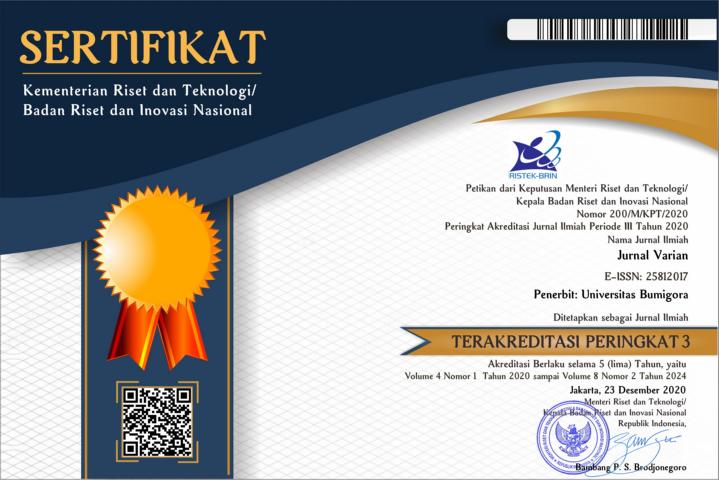Comparison of Naive Bayes Classification Methods Without and With Kernel Density Estimation
Abstract
Halal certification is important to give confidence to Muslim consumers around the world regarding the halalness of products. The Halal Product Assurance Organizing Body (BPJPH) is the official auditor in Indonesia that is responsible for the halal certification process. This study aims to address the need for verification and validation of data for halal certification applications in Indonesia by using the data science approach and machine learning technology. In this study, the Naïve Bayes classification method was used to optimize the data verification and validation process. However, this method needs to be improved by applying optimization methods such as Kernel Density Estimation (KDE) to improve classification results. The results showed that the Naïve Bayes classification method with KDE optimization produced better performance than the Naïve Bayes method without optimization. The performance of the Naïve Bayes classification model without optimization achieves 87.6% Accuracy, 85.4% Recall, 88.8% Precision, and 87.1% Fmeasure. Meanwhile, the Naïve Bayes classification model with KDE optimization achieves 97.5% Accuracy, 95.9% Recall, 98.9% Precision, and 97.8% Fmeasure. Thus, it can be concluded that the Naïve Bayes classification algorithm with KDE optimization results in a performance increase of 9.9% compared to the Naïve Bayes method without optimization. This research has important implications in handling complex and non-normally distributed data and providing solutions for BPJPH in the process of verifying halal certification.
References
2151. https://doi.org/10.37200/IJPR/V24I3/PR200962.
Bakar, N. A. and Rosbi, S. (2019). Robust framework of halal certification process with integration of artificial intelligent method.
Journal of Islamic, Social, Economics and Development (JISED), 4(20):47–55.
Bullmann, M., Fetzer, T., Ebner, F., Deinzer, F., and Grzegorzek, M. (2018). Fast kernel density estimation using gaussian filter
approximation. In 2018 21st International Conference on Information Fusion (FUSION), pages 1233–1240. IEEE. https://doi.org/
10.23919/ICIF.2018.8455686.
Delizo, J. P. D., Abisado, M. B., and De Los Trinos, M. I. P. (2020). Philippine twitter sentiments during covid-19 pandemic using
multinomial na¨ıve-bayes. International Journal, 9(1.3). https://doi.org/10.15294/rji.v1i2.68324.
Haben, S. and Giasemidis, G. (2016). A hybrid model of kernel density estimation and quantile regression for gefcom2014 probabilistic load forecasting. International Journal of Forecasting, 32(3):1017–1022. https://doi.org/10.1016/j.ijforecast.2015.11.004.
Ji, H., Huang, S., Lv, X., Wu, Y., and Feng, Y. (2019). Empirical studies of a kernel density estimation based naive bayes method for
software defect prediction. IEICE TRANSACTIONS on Information and Systems, 102(1):75–84. https://doi.org/10.1587/transinf.
2018EDP7177.
Kashif, A. A., Bakhtawar, B., Akhtar, A., Akhtar, S., Aziz, N., and Javeid, M. S. (2021). Treatment response prediction in hepatitis c
patients using machine learning techniques. International Journal of Technology, Innovation and Management (IJTIM), 1(2):79–
89. https://doi.org/10.54489/ijtim.v1i2.24.
Mohammad, M. F. M. (2021). The pengaturan sertifikasi jaminan produk halal di indonesia. Kertha Wicaksana, 15(2):149–157.
https://doi.org/10.22225/kw.15.2.2021.149-157.
Nugroho, A., Hidayatillah, R., Sumpeno, S., and Purnomo, M. H. (2019). Klasifikasi interaksi kampanye di media sosial menggunakan na¨ıve bayes kernel estimator. Jurnal Nasional Teknik Elektro dan Teknologi Informasi, 8(2):107–114.
Qin, B. and Xiao, F. (2018). A non-parametric method to determine basic probability assignment based on kernel density estimation.
IEEE Access, 6:73509–73519. https://doi.org/10.1109/ACCESS.2018.2883513.
Sen, P. C., Hajra, M., and Ghosh, M. (2020). Supervised classification algorithms in machine learning: A survey and review. In
Emerging Technology in Modelling and Graphics: Proceedings of IEM Graph 2018, pages 99–111. Springer. https://doi.org/DOI:
10.1007/978-981-13-7403-6 11.
Silverman, B. W. (2018). Density estimation for statistics and data analysis. Routledge. https://doi.org/10.1201/9781315140919.
Siswanto, S., Mar’ah, Z., Sabir, A. S. D., Hidayat, T., Adhel, F. A., and Amni, W. S. (2022). The sentiment analysis using na¨ıve
bayes with lexicon-based feature on tiktok application. Jurnal Varian, 6(1):89–96. https://doi.org/10.30812/varian.v6i1.2205.
Tarannum, S. (2023). Halal Food Identification from Product Ingredients using Machine Learning. PhD thesis, United International
University. https://dspace.uiu.ac.bd/handle/52243/2852.
Weglarczyk, S. (2018). Kernel density estimation and its application. In ITM web of conferences, volume 23, page 00037. EDP
Sciences.

This work is licensed under a Creative Commons Attribution 4.0 International License.


















